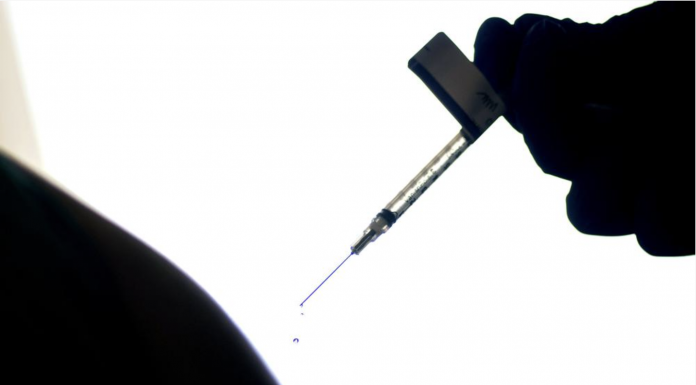Oct 4 (Reuters) – The effectiveness of the Pfizer Inc/BioNTech SE vaccine in preventing infection by the coronavirus dropped to 47% from 88% six months after the second dose.
The finding published on Monday is based on the data that U.S. health agencies considered when deciding on the need for booster shots.
The data, which was published in the Lancet medical journal, had been previously released in August ahead of peer review.
The analysis showed that the vaccine’s effectiveness in preventing hospitalization and death remained high at 90% for at least six months, even against the highly contagious Delta variant of the coronavirus.
The data suggests that the drop is due to waning efficacy, rather than more contagious variants, researchers said.
“The Pfizer-BioNTech coronavirus vaccine is 90 percent effective at preventing hospitalization for up to six months, with no signs of waning during that time period, according to a large new U.S. study conducted by researchers at Pfizer and Kaiser Permanente.” – The New York Times, Oct. 5, 2021
Researchers from Pfizer and Kaiser Permanente studied electronic health records of roughly 3.4 million people who were members of Kaiser Permanente Southern California between December 2020 – when the vaccine first became available – and August of 2021.
Luis Jodar, senior vice president and chief medical officer at Pfizer vaccines, said:
“Our variant-specific analysis clearly shows that the (Pfizer/BioNTech) vaccine is effective against all current variants of concern, including Delta” … READ MORE.
New Study Finds Pfizer Vaccine Provides Strong Protection Against Hospitalization
THE NEW YORK TIMES – The Pfizer-BioNTech coronavirus vaccine is 90 percent effective at preventing hospitalization for up to six months, with no signs of waning during that time period, according to a large new U.S. study conducted by researchers at Pfizer and Kaiser Permanente.
The vaccine also provides powerful protection against the highly contagious Delta variant, the scientists found. In a subset of people who had samples of their virus sequenced, the vaccine was 93 percent effective against hospitalization from Delta, compared with 95 percent against hospitalization from other variants.
“Protection against hospitalization remains high over time, even when Delta predominates,” said Sara Tartof, an epidemiologist at Kaiser Permanente Southern California and the first author of the study.
The vaccine’s effectiveness against infection did decline over time, however, falling from 88 percent during the first month after vaccination to 47 percent after five months.
The findings, published in The Lancet on Monday, come amid a debate over whether, and when, booster shots may be necessary.
The Food and Drug Administration has authorized boosters for recipients of the Pfizer vaccine who are 65 or older or at high risk for infection or severe disease. And the Biden administration has pushed for boosters to be made more widely available to the general population.
But many scientists and public health experts have pushed back, arguing that the nation’s priority should be getting the shots to people who have not yet been vaccinated and that the vaccines still appear to provide good protection against the worst outcomes, including severe disease and death … READ MORE.



